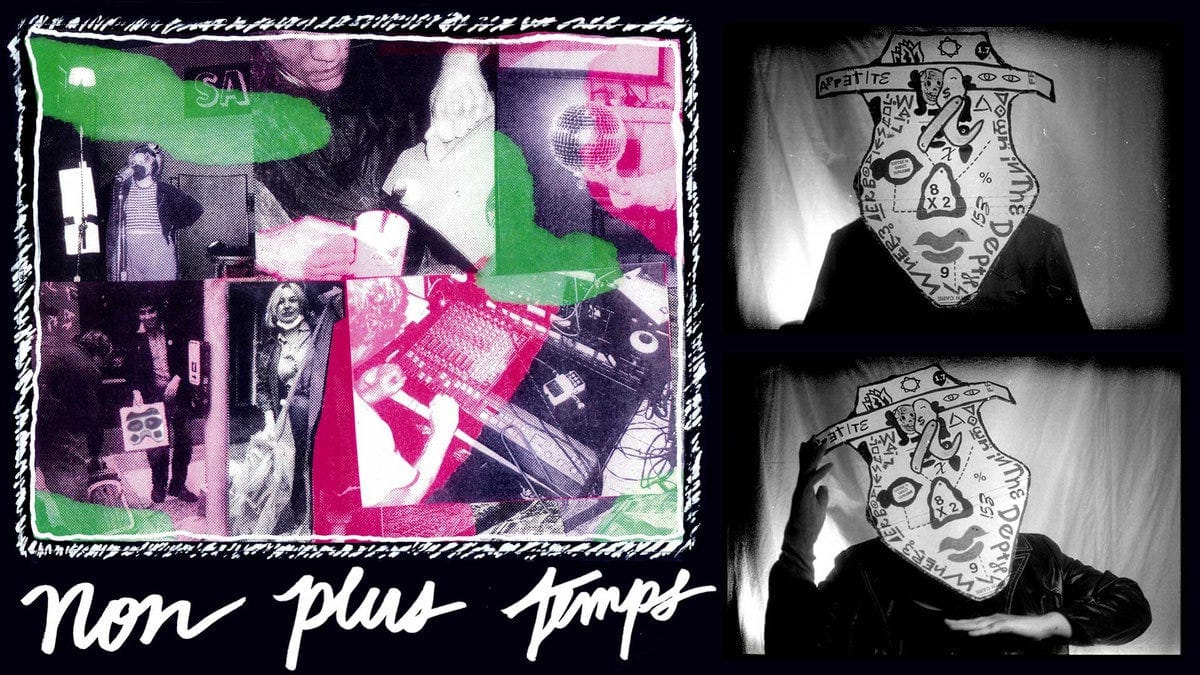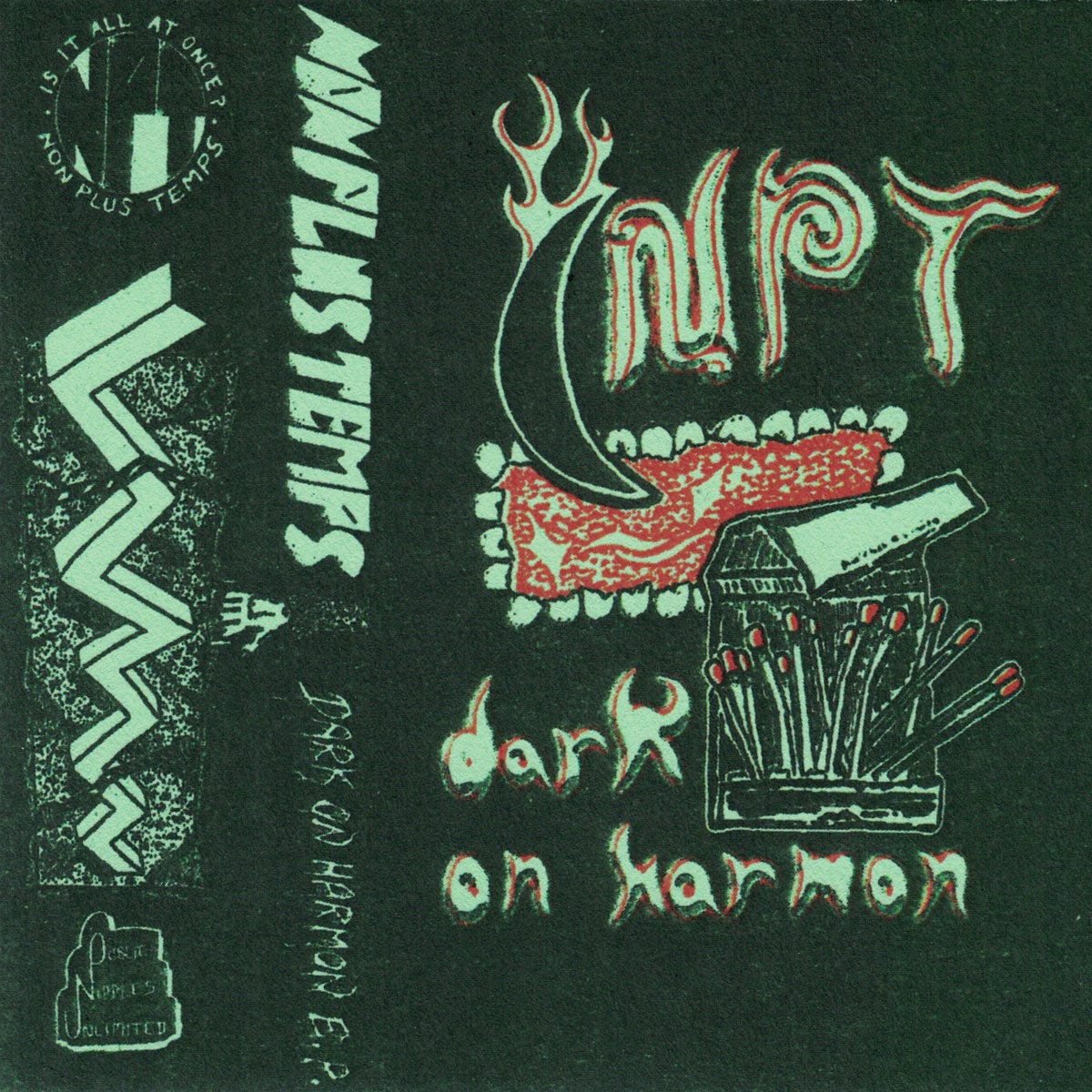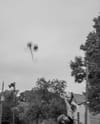"A Garbled Curse on Time"
On Non Plus Temps on Harmon

A sonic essay on Do-It-Yourself techne, “a garbled curse on time,” or the most soulful post-punk outfit of the fucking conjuncture; Oakland’s Non Plus Temps are many things—but don’t call them a band. “Individual authorship is a myth enforced by the regime of private property to conceal the social character of production,” they explain in the liner notes to their first LP; and “‘the band’ is no better so long as it’s modeled on the bourgeois nuclear family.”
Not a band, then, but a hub—Non Plus Temps’ new EP, Dark On Harmon, arrives at the height of summer, in time for the dog days of protest and the groggy, inevitable comedown; for bike rides to mystery gigs and midnight picnics; and for further unforeseeable conspiracies. In some ways, Dark On Harmon feels pared down from the haunted house party of their 2022 debut, Desire Choir; though it follows in relatively quick succession and pairs well with the preceding statement. Once again the Tascam is both tool and concept, as the tape is a sonic terrain: “Every four-track mixdown cemented in place another layer of sedimentary noise, another vision of superseding our condition as human rentals.”
Here composition is accreted time, as human activity stages a collaboration between dead and living labour. This mediological insight, praising magnetic tape as a micro-generational record of a process, resonates with the group’s keen sense of music history and their place in its often circular, self-referential, progress. Non Plus Temps consciously summarizes an archive of danceable, dubbed-out post-punk, channeling groups like the Flying Lizards or the New Age Steppers. This lineage is clear in sound alone, but named as such in the group’s gnomic manifestoes, written by Sam Lefebvre and Andy Human, which describe “a communist interpretation of collective music” chiefly inspired by the On-U Sound label and its permutating roster.
Dub is densely socialized music, offering what critic Michael Eldridge calls “new takes on old times,” whether discovered in studio or dance hall. As Vivien Goldman rhapsodizes, “any sound—a dog–fight outside the studio window, door–bells ringing, the uncanny squeal of tape re–winding in the studio, a stranger cursing as he stumbles into the studio by mistake—incorporates easily into dub.” This blurring of timescales and interiors suits Non Plus Temps’ demonstrative purposes, where Dark On Harmon depicts the embattled society of the apartment in which it was recorded, quoting eviction notices as if an inside joke.
One-sidedly, the emphasis on post-production may be symptomatic of mid-COVID musical convention and of capitalist disorganization more generally, facilitating exchange between isolating monads. But dub music in particular prizes the sociality of sound, as a spatial arrangement as well as an event in time. To follow Goldman’s formalization—SOUND = MUSIC = MOVEMENT—dub potentiates all sonic phenomena as compositional information, only in retrospect of its social utility; and the sonic envelope of Dark On Harmon convokes a shadowy hang.
As affirmed on record and at any number of gigs, including the best show that I’ve seen this year, Non Plus Temps is a pro-social inside-outing; enlisting a rotating crew of participants in a sonically smeared, weirdly gregarious melange, not without songs. This agenda now includes the crepuscular dub of ‘Saw the Car Free,’ replete with baying dogs and sputtering engines, a fever documentary or dream; the hushed, concretely escapist incantation of ‘Hide Away’; or the industrial soundscape of ‘Clod Clog,’ which speaks of “splashing glass”—an insurrectionary figure, also evocative of the brittle, PiL-like guitar swells that colour the churning din.

Beyond closed quotation, Non Plus Temps channel their forebears with intent, extending a communal ethic back and forward in time. This knowingness feels convivial and non-foreboding, prompting participation—in punk as process; dub as sonic reservoir, knowing no scarcity of means; and DIY as an authentically resistant enclave. As importantly, every aspect of the group’s self-presentation seems to insist on its own provisionality; making a tentative departure from present conditions, and borrowing a latent, partial music from its total, social form. Almost no one plays this well, though anybody could, and the sound of Non Plus Temps is invitational—succinct in itself, but without end.
